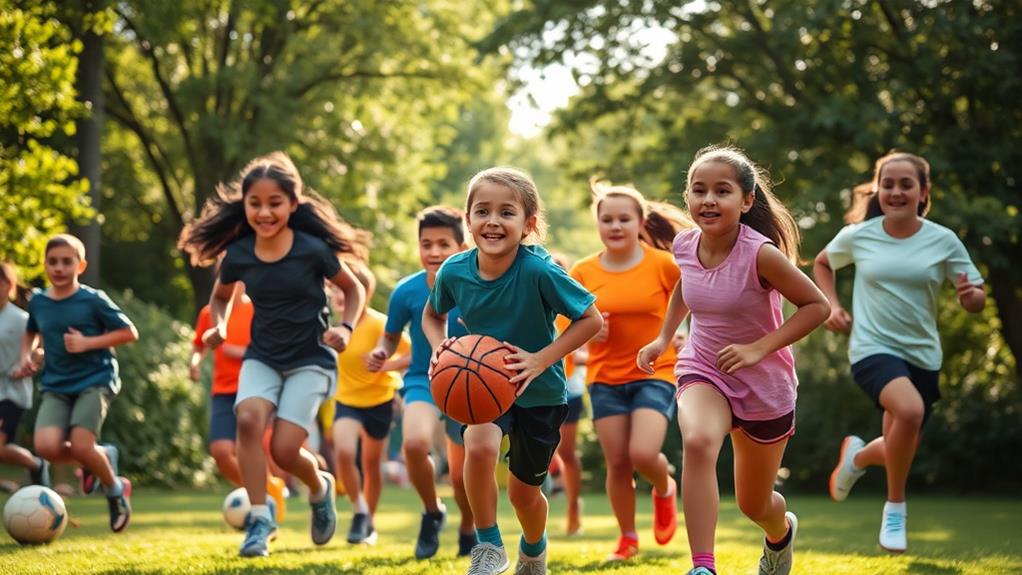Physical Development
Youth sports are essential for developing strong bodies and combating childhood obesity. By engaging in sports, children improve their strength, coordination, and overall physical health.
For example, playing soccer or basketball regularly can increase muscle mass and flexibility.
Mental and Emotional Well-being
Participating in sports has a profound impact on a child's mental and emotional well-being.
Sports boost self-esteem and reduce anxiety, leading to more confident and connected individuals. This, in turn, helps children develop a more positive outlook on life.
Academic Performance
Youth athletes often excel academically, achieving better GPAs and higher graduation rates.
Sports teach valuable skills like discipline, hard work, and time management, which translate to success in the classroom.
Social Benefits
Sports provide opportunities for children to develop essential social skills like teamwork, communication, and leadership.
Coaches act as mentors, fostering valuable life skills and guiding children towards becoming well-rounded individuals. Additionally, youth sports help build strong community ties by bringing families and neighbors together.
Holistic Development
In summary, youth sports play a vital role in shaping a healthier, more well-rounded individual.
By participating in sports, children develop physically, mentally, and socially, setting themselves up for success in all areas of life.
Physical Health Benefits

Youth sports participation lays the foundation for lifelong physical health and wellness. By engaging in regular physical activity, you combat the alarming 19.7% childhood obesity rate in the U.S. and promote healthy weight management.
Consistent involvement in sports significantly lowers your risk of future ailments such as heart disease, cancer, and diabetes, while enhancing your cardiovascular health.
Regular physical activity improves overall physical development. As you develop your skills under coaching, you'll notice improvements in coordination, strength, and endurance, key components of healthy physical development during childhood and adolescence.
Active youth are five to six times more likely to stay physically active as adults, fostering lifelong habits that lead to better overall fitness and well-being.
Youth sports participation also improves sleep quality. Engaging in sports can improve your quality of sleep, which is crucial for growth during your teenage years.
Psychological Advantages
Youth sports participation has a profound impact on a child's psychological development.
Engaging in sports can boost mental health, leading to lower rates of anxiety and depression, and increased happiness and motivation.
Participating in team sports helps children develop essential social skills, such as respect, tolerance, and fair play.
These skills are crucial for building strong relationships and are often transferred to everyday life.
Some key psychological benefits of youth sports include:
Improved self-esteem and self-confidence, especially in girls, as they develop a sense of accomplishment and pride in their abilities.
Reduced feelings of loneliness and healthier lifestyle choices, as sports participation provides opportunities for social interaction and encourages a healthy and active lifestyle.
Enhanced cognitive performance, leading to better creativity and academic outcomes, as exercise has been shown to improve concentration, memory, and problem-solving skills.
Lower rates of anxiety and depression, as physical activity has been proven to reduce symptoms of anxiety and depression in children.
Academic Impact

Youth Athletes Excel Academically
Youth athletes tend to excel academically, with GPAs and test scores significantly higher than their peers who don't participate in sports. In fact, studies show that student-athletes often have GPAs up to 40% higher than non-participants. This is because engaging in youth sports fosters discipline and enhances critical thinking skills, which can translate into improved academic achievement.
Improved Graduation Rates
Student-athletes are more likely to graduate high school compared to non-participants, leading to higher graduation rates. 73% of female athletes aspire to graduate from a four-year college, showcasing how sports can elevate educational ambitions.
Increased Student Engagement
Schools with robust sports programs often report higher levels of student engagement and morale. When students feel connected through athletics, they're more likely to thrive in an environment that supports their educational goals.
Student-athletes are more likely to feel connected to their school and have higher morale, leading to a better educational experience.
Setting the Foundation for Academic Success
Involvement in youth sports sets the foundation for academic success and a brighter future. By participating in sports, students develop skills and habits that benefit them academically, such as discipline, critical thinking, and goal-setting.
Youth sports participation can have a lasting impact on academic achievement and future success.
Social Connections
Social Connections in Youth Sports
Youth sports foster essential social connections that complement academic achievements. Engaging in sports allows children to develop social skills and form lasting friendships. These connections are vital for healthy relationships, teamwork, and cooperation.
Sports teach valuable lessons in sportsmanship and empathy. Through sports, kids learn to communicate effectively, expressing themselves within a team setting while building a supportive social network.
Participating in sports reduces feelings of loneliness and isolation by providing a sense of belonging.
Key benefits of social connections in youth sports include:
- Teamwork and cooperation are promoted through youth sports.
- Friendships formed in sports often extend beyond the field.
- Good sportsmanship fosters empathy and understanding.
- Improved communication skills lead to better relationships.
How does Youth Sports Development also contribute to Community Development?
Youth sports development plays a vital role in community development. By providing young people with opportunities to participate in organized sports, it helps instill values such as teamwork, discipline, and leadership. These skills not only benefit the individual but also contribute to the overall well-being and growth of the community. The role of sports community development cannot be understated.
Coaching Importance

Coaches are essential in youth sports, serving as mentors who guide young athletes in their athletic and personal development. They play a crucial role in enhancing the overall experience, ensuring that athletes develop valuable life skills in addition to their athletic abilities. Effective coaches focus on the individual's holistic development, rather than just their athletic performance.
Coaches teach important life skills, such as teamwork, leadership, and inclusivity. Through their guidance, athletes learn to work together towards a common goal, develop leadership skills, and understand the importance of inclusivity. These skills are vital not only in sports but also in life, as they help individuals navigate challenges and build strong relationships.
Quality coaching has a significant impact on the positive developmental effects of youth sports. Research has shown that well-equipped coaches maximize the benefits of participating in youth sports, including the development of self-confidence and discipline. Parents often cite these benefits as a key reason for their children's participation in sports.
Programs that improve coaching effectiveness, such as the University of San Diego's coaching certificate, are essential in creating a supportive environment for young athletes. These programs empower coaches to create an environment where athletes can thrive, both on and off the field.
When athletes engage with a supportive coach, they build a foundation for their future, developing into well-rounded individuals and athletes.
Community and Economic Effects
Community Enrichment
Youth sports programs have a profound impact on entire communities, extending beyond the athletes themselves. Active communities promote better health outcomes by increasing participation rates in physical activity.
For instance, a vibrant neighborhood where residents unite through shared interests can bridge cultural and political divides.
Economic Benefits
Investing in youth sports yields substantial economic returns. Increased youth sports participation can lead to over 1.4 million additional years lived in good health.
Furthermore, the global economy could save nearly $68 billion annually through increased physical activity. In the U.S., potential savings in medical costs and productivity could reach up to $28 billion.
Community sports programs foster cohesion, enhancing the quality of life for everyone involved.
Investing in Youth Sports
Supporting youth sports isn't just about athlete development; it's about creating healthier, more connected communities while alleviating medical costs.
Questions and Answers
Why Is Youth Development Important in Sport?
Youth development in sport is crucial because it empowers individuals to build character and social skills while fostering emotional resilience.
Teamwork values are learned through shared experiences, and discipline habits are developed as individuals work together towards a common goal.
Staying active has significant health benefits, and leadership opportunities shape one's future.
Forming lifelong friendships and practicing goal setting contribute to a well-rounded, confident individual ready for life's challenges.
How Do Sports Benefit Youth?
Participating in sports has numerous benefits for youth. Teamwork skills and social connections are developed through teamwork and communication with teammates. This leads to creating lasting friendships and a sense of belonging.
Engaging in physical activities improves fitness levels and enhances emotional health by reducing stress and anxiety.
Discipline and goal setting, essential skills learned through sports, foster mental resilience and perseverance.
As youth practice and train, confidence and leadership qualities are built, preparing them for future challenges.
Essential life skills, such as communication, problem-solving, and adaptability, are developed through sports participation.
Why Do Youth Sports Matter?
Youth sports matter because they've a profound impact on a young person's life.
They improve physical fitness by developing strength, speed, and agility through regular exercise and training. This, in turn, enhances overall health and reduces the risk of obesity.
Youth sports also foster emotional resilience by teaching kids to cope with losses and setbacks, and to bounce back from failures. This helps build mental toughness, a vital life skill.
Participating in sports teams teaches social skills, such as communication, cooperation, and mutual respect among teammates. These skills are essential for forming strong relationships and achieving common goals.
Through sports, young people learn essential life skills, including self-discipline, time management, and goal-setting. They understand the importance of setting targets, creating plans, and working towards achieving them.
Additionally, youth sports provide opportunities for leadership development and confidence building. As players take on new roles and responsibilities, they grow in confidence and develop a sense of self-worth.
Lastly, youth sports help build connections within the community by fostering a sense of belonging and social responsibility. Young people develop a sense of pride and ownership, which extends beyond the playing field.
What Is the Purpose of Sports Development?
Sports development aims to increase sports accessibility, making it possible for everyone to participate.
This goal is achieved by fostering community engagement and promoting social interaction, which helps build lasting relationships. For instance, joining a local soccer team can connect you with neighbors and like-minded individuals.
Sports development helps develop leadership qualities and emotional resilience through skill acquisition and teamwork dynamics.
Acquiring new skills, such as perfecting a tennis serve, boosts confidence and self-esteem. Teamwork dynamics, like working together to win a basketball game, teach valuable lessons in communication, trust, and adaptability.
Sports development encourages goal setting, leading to lifelong fitness and improved physical health.
Setting specific, achievable goals, such as running a certain distance or completing a marathon, motivates individuals to maintain a regular exercise routine. This, in turn, improves overall physical health and reduces the risk of chronic diseases.
Ultimately, sports development shapes well-rounded individuals prepared to tackle life's challenges with confidence and collaboration.